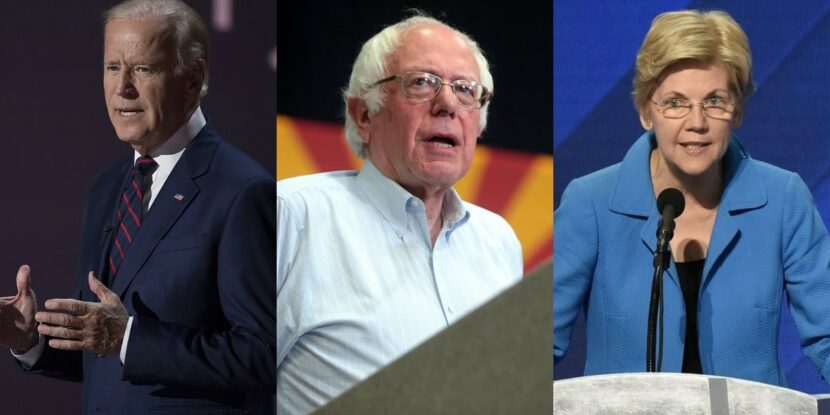About this time last year, The National Pulse ran a series previewing the 2020 Democrat presidential primaries. We looked at the favorites, the middle-tier underdogs, the long shots, and the wild cards. At the time, there were only two minor candidates in the race and plenty of speculation about who would enter.
Now it’s 2020 and there’s exactly one month to go until the first-in-the-nation Iowa caucuses. A potential field of dozens has been whittled down to a handful of front runners and some outsiders scrambling to keep up. DNC rules requiring candidates to reach certain polling thresholds and fundraising targets to qualify for debates have culled many candidates from the field. In this series, we’ll take a fresh look at the candidates as the new year begins and give post-mortems for those who are no longer with us. In this first article I’ll examine those I identified as front runners last year, and the front runners I didn’t see coming.
The Early Front Runners
Joe Biden
Biden is at the top of the pack, as expected, but he’s had a bumpy campaign since entering the race in April. The 77-year-old has faced questions about his mental state after numerous incidents in which he forgot where he was or when something happened, some botched sentences, and a strange story about his “hairy legs.” He got in a viral confrontation with a voter in Iowa, calling him a “damn liar” and “fat.” He’s been the punching bag of other candidates on the debate stage, most notably a June exchange with Sen. Kamala Harris over his record on civil rights. He’s flip-flopped on abortion and tried to placate the Left on other issues. And his “No Malarkey” re-branding effort fell flat.
But the voters apparently haven’t cared about all his misadventures, because his December 2019 RealClearPolitics polling average was virtually identical to his average from December 2018, showing him holding first place at about 28 percent nationally. His fundraising numbers have been generally strong. Biden appears to be repeating the pattern that Mitt Romney faced in the 2012 GOP primaries: the undesirable front runner who faces surging challengers who eventually peter out. If the pattern continues, the start of real voting will whittle the field down to Biden and one or two serious challengers (like how 2012 came down to Romney and Rick Santorum). At this point, the race is still Biden’s to lose.
Bernie Sanders
Sanders has held a steady second place since joining the race in February, and his poll numbers have also barely changed since last year, hovering around 20 percent nationally. He’s doing much of the same thing he did in his 2016 showdown with Hillary Clinton by holding big rallies and hauling in huge amounts of cash, mostly from small donors. His campaign has been essentially free of scandal and controversy, and though he’s actually older than Biden, he has faced no questions of mental fragility. He’s in a good position to win several delegates in the Iowa caucuses and has an outside chance of placing first, and he’s in even better position to win New Hampshire the following week.
The most relevant question at this point, perhaps, is about Sanders’ ceiling. Can Sanders coalesce enough voters around his campaign to take out Joe Biden, or are most Democrats just not ready for a socialist nominee? With big coffers and steady popularity, expect Sanders to go deep into the race.
Elizabeth Warren
Warren has had a tenuous grip on third place and is limping into 2020. She has sought to position herself as a more palatable alternative for far-left voters to Bernie Sanders, whose calls for “political revolution” have caused anxiety for some Democrats. She has survived plenty of attacks on the debate stage, especially at an Ohio debate in October. But her poll numbers took a hit in November after she unveiled a “Medicare for All” plan which would eliminate private health insurance and replace it with a government-run system.
Her campaign claimed the plan would cost $20.5 trillion in new federal spending over 10 years, funded by huge taxes on employers and the wealthy, but even left-leaning think-tanks have said the price tag is more realistically in the $30 trillion range. Warren is not the only Democrat candidate to have voiced support for government-run health care, but releasing the actual details of the plan have caused voters to come face-to-face with what it would actually mean. She has now essentially stopped talking about it on the campaign trail.
Warren’s fundraising also slowed in the final quarter of 2019. She trails in the polls in the February primary states of New Hampshire, Nevada, and South Carolina, but she is in the mix in Iowa. She may need to win Iowa to keep her campaign alive.
Kamala Harris
Harris stormed into the race last January, announcing her bid before a crowd of 20,000 in Oakland, California. She had her moment in the spotlight over the summer, surging after confronting Joe Biden over segregation in what was probably the most memorable debate moment thus far. But Harris could not keep up her momentum as she struggled to fundraise the huge sums required to compete with the front runners. A bizarre written meme also emerged on the internet — “Kamala is a cop,” referencing her experience as a prosecutor in a time when leftist voters don’t care much for law and order — which did an unclear amount of harm to her campaign.
By late October Politico reported she was hemorrhaging cash and laying off dozens of staffers, and on December 3, she dropped out of the race.
The Underachievers, No-Shows and Surprise Favorites
Cory Booker
Booker’s uninspired campaign has many wondering whether he’s even still in the race, because he failed to qualify for the last debate of 2019 and might not qualify for the first debate of 2020 based on DNC rules. After a video ad filled with clichés to kick off his campaign in February, Booker peaked at 9 percent in a single poll and hasn’t garnered more than 4 percent since April. If he doesn’t make this month’s debate, expect Booker to close the books on his first presidential campaign and leave an all-white field of candidates on the stage, a rich irony for a party so focused on identity politics.
Hillary Clinton
Clinton made my list of front runners last year because there were constant pleas for her to jump in and save the party from Biden, and she hinted that she might be willing to run. It’s still possible that Clinton will make a late entry into the race, or perhaps emerge out of a brokered convention as a compromise nominee. But for now she’s still the probably-not-but-maybe-in-her-dreams candidate.
Pete Buttigieg
Buttigieg has made me and many others look like fools. I gave him one sentence in my long-shots category last year. Give me at least a small break — after all, he wasn’t even asked about in a national poll until late January 2019 and didn’t crack 5 percent until April. But he has charmed some portion of the Democrat base, and has played the identity politics card hard, touting his status as a gay man frequently and seeking to twist conservatives’ faith against them. His youth on a debate stage filled with 70-somethings has drawn a sharp contrast. And he’s been holding down first place in Iowa polls since November.
Buttigieg will be the main target in this month’s debate, the final debate before the Iowa caucuses. He deflected a strafing from Elizabeth Warren in the last debate when she said he was raising money from wealthy elites in wine caves in Silicon Valley, but questions about his fundraising — much of which has indeed come from disproportionately wealthy donors — is sure to continue to attract continued scrutiny. Opponents are also looking to turn his three-year tenure at McKinsey & Co., a consulting firm with a reputation for scandal and distasteful practices, into what Mitt Romney’s time at Bain Capital was for him — a line of attack in which Buttigieg is painted as a technocratic elitist who doesn’t actually care for ordinary people.
Buttigieg’s opponents have one month to take him down, because if he wins Iowa his rise could be unstoppable.
Part II
Next time, we’ll look at the middle-tier underdogs — where they are now, and one surprise who has been ignored but perhaps shouldn’t be.


